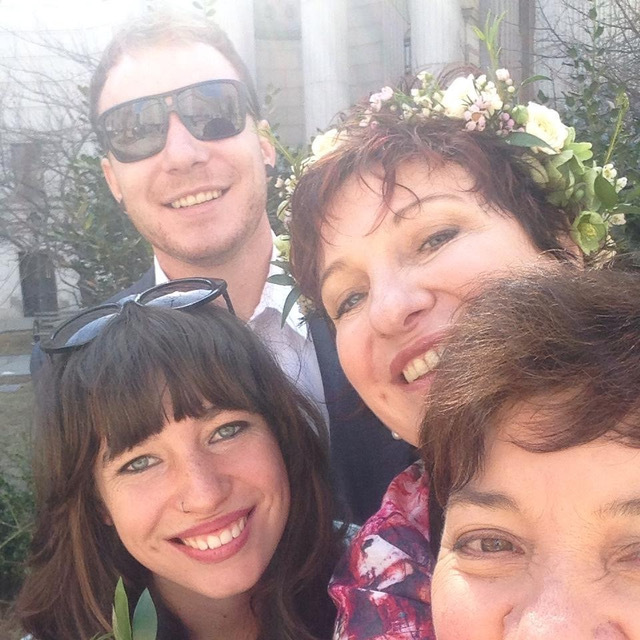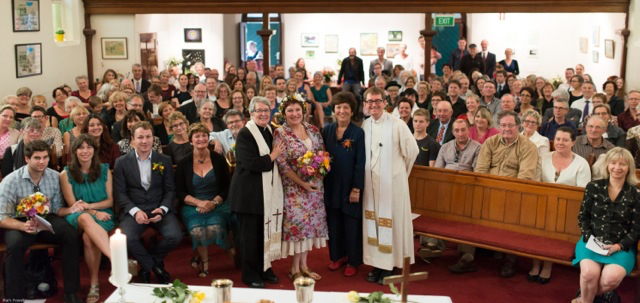The title of my first foray into this topic was “Always a bridesmaid, never a bride – recognising same-sex relationships”. I chose that title because my partner, Melissa Gibson, had been a bridesmaid six or seven times, but we couldn’t get married and she could’t become a bride.
Melissa has two children, Luke and Amelia, from a prior relationship with their father, Michael Woods. Michael, Melissa and I have raised the children together since they were small, and until the children were 18 we lived in adjacent suburbs so that they could move easily between both homes.
We have attended hundreds of soccer games as a family so that Mum, Dad and Julie could cheer the children together. We have shared all the birthdays. Every Christmas began with an open-house breakfast at our home so that all the family could be together, before going to varied lunches. On Mother’s Day and Father’s Day Michael, Melissa and I exchanged cards and gifts.
The children were four and six when I met Melissa. They are 24 and 26 now. Amelia is now Dr Amelia Woods, currently working in her first year as a doctor in Melbourne. Luke is a plumber and is working all over Greater Sydney. Both Luke and Amelia are in long-term, committed heterosexual relationships.
There is nothing that would give me more joy than to hear that Luke and Amelia were planning to marry and have children of their own. Melissa and I are now at an age when many of our gay and straight friends are becoming grandparents and Melissa is very keen to be a grandmother. I find it impossible to put into words what it would mean to me to hold Luke or Amelia’s child in my arms.
Why am I telling you these personal things about my life and my family? I am telling you because I believe that “coming out” and being open about our lives influences how people think and feel about gay and lesbian people. “Coming out” can help decision-makers include us in every aspect of community life, rather than exclude us.
My whole life journey as a lesbian has been a journey from exclusion to inclusion. I believe our inclusion within the scope of the Commonwealth Marriage Act will be an important milestone on the journey to full citizenship and full equality before the law.
I first thought I was a lesbian when I was 13. I saw a film called The Loudest Whisper starring Shirley McLaine and Audrey Hepburn. It was based on a play by Lillian Hellman called The Children’s Hour, a true story about two teachers falsely accused of being gay and the outcome for them and their school. If you want to understand the emotional climate in which gay and lesbian people of my era grew up, watch this film. It ends with a suicide, as every play, book, or film on the theme of homosexuality did at that time.
When I accepted I was gay in the early 70s, homosexuality was still a mental illness under the DSM (the Diagnostic and Statistical Manual of Mental Disorders), the so-called “psychiatrists’ bible”. In the early 70s, homosexuality was the subject of the criminal law and all faith communities proclaimed it was against God’s will.
The changes I have seen in my lifetime give me great joy and hope for the future. Homosexuality was removed from the DSM in 1973. Homosexuality was gradually decriminalised in Australia, starting in South Australia in 1975 and concluding in Tasmania in 1994. State and Territory laws now allow gay and lesbian people to adopt and foster children in several Australian jurisdictions.
We have seen open, gay and lesbian people accepted into our community’s leadership positions: teachers in schools, a President of the AMA, members of the High Court, a minister of the Crown and members of the clergy in some Christian churches and rabbis in some Jewish synagogues.
The Sydney Mardi Gras has changed from an edgy street protest with multiple arrests to an international community expression of inclusion. The marchers now include contingents from the defence forces, the police and first responders; political leaders from all parties; organisations from government, non-government and the private sector; and the Uniting Church and some other religious organisations.
Marriage equality is inevitable in Australia. With the leaders of our major parties supporting it, why is it taking so long?
Meanwhile, gay and lesbian people who want to celebrate their love in the traditional way and give legal force to their commitment to each other have started getting married wherever they can. Many Australian same-sex couples have married in New Zealand, the United States, the UK, Canada and other countries. Some have married in Embassies on Australian soil.
I always planned to wait until Melissa and I could marry in Australia. However, in 2013, I was diagnosed with stage four throat cancer. I was sitting in the Kinghorn Cancer Centre having chemotherapy when I realised I may not have enough time to wait for the Commonwealth Marriage Act to change in Australia. I asked Melissa if she would come to New York and marry me if I survived.
To my joy, Melissa said, “Yes”, and I did survive. In April 2014 Luke, Amelia, Melissa and I travelled to New York. Michael, the children’s Dad, supported our plans and gave us a present. A handful of close friends gathered at the Office of the City Clerk in Manhattan for the civil ceremony. My brother, Dr Ian McCrossin, came to New York and witnessed the marriage.
On our return, a Blessing ceremony was held at South Sydney Uniting Church where Melissa and I attend services. It was standing room only. Several of my friends took Communion for the first time in many years. I think they were heartened and moved by the inclusive joy and faith filling the church that day.
Within the Christian community there are places where gay and lesbian people are welcomed and included. The Uniting Church ordains gay and lesbian people. While they do not support marriage equality at this time, they are having a respectful conversation about it. I am an Elder on the Church Council of the South Sydney Uniting Church and the Treasurer. Our Minister, Andrew Collis, is not gay but he welcomes everyone to his congregation.
I am currently studying theology at United Theological College. I am also on the Board of SCEGGS Darlinghurst, an Anglican school that both Amelia and I attended. I have had the honour of being invited to speak at Speech Day on two occasions at SCEGGS over the past 20 years.
Perhaps the biggest obstacle to marriage equality is debate over the welfare of children in same-sex families. Dr David van Gend, in Stealing from a Child: The Injustice of ‘Marriage Equality’ (2016) cites research demonstrating that children do best in married, heterosexual families with their biological parents. He points to the unreliable results of studies that suggest children can do just as well with same-sex partners.
The results of many of these studies can be challenged on a range of factors: lack of random selection of the people to be studied, lack of sample size, the perceived bias of the researcher and the perceived bias of the funding source. Dr van Gene also points to the fact that many of the children in the families that were studied were too young to speak for themselves.
There are examples of adult children of same-sex couples speaking out about a sense of loss and a yearning to know the person who was the biological source of their life. Many of these adult children speak lovingly of their same-sex parents, while saying they still experience an absence in their life.
I believe we must listen to the voices of older children who express concern about their inability to identify or locate the man or woman who was their biological source of life. Just as we must listen to any adult children who tell us that they felt the absence of a mother or father. Of course, there are many different types of families with same-sex parents. Many of the children know their mother and their father, even if they are not living under the same roof.
I agree that we need good quality, long-term research into the experience of children from same-sex families – and all the other family types where children are raised – single parents, divorced and separated couples, and children of widowed and adopted families.
We need research that uses excellent methodology with large, random samples. We need research that is conducted by independent researchers and funded independently by organisations that are not associated with advocacy. The purpose of such independent research should be to help us, as a community, to identify what we can do to support children in all types of families.
We want to help ALL children to be as happy, healthy and successful as possible.
We need to promote the results of this research throughout the community via mainstream and social media. Let’s talk about the challenges children face and what parents, extended family, teachers, the health sector and the general community can do to help support these children and their parents.
When Amelia was only six years old she asked me, “Why can’t you and Mummy get married?” One of the big lessons I learned at our marriage in New York and our blessing in South Sydney was how happy it made our children.






